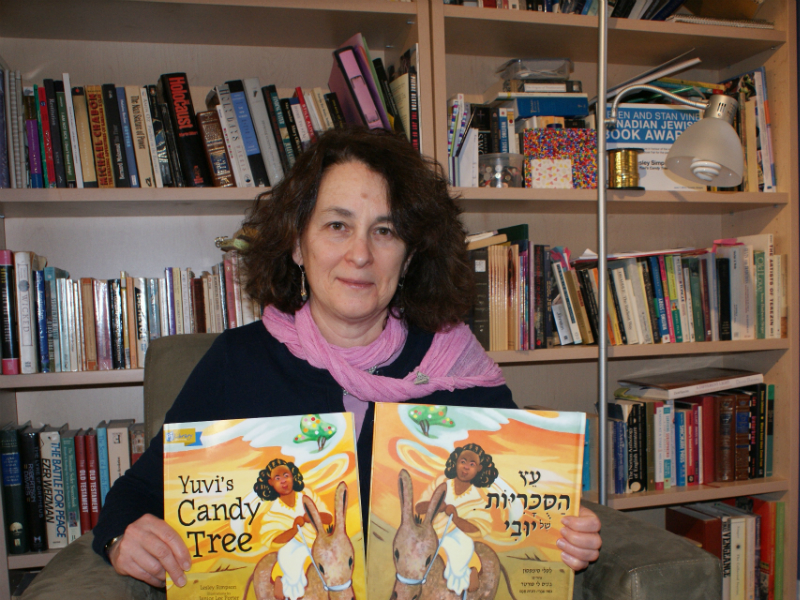Yuvi dreamed of a land where candy grew on trees and a Jewish child from Ethiopia could live in safety.
Toronto author Lesley Simpson captured that story in her children’s book, Yuvi’s Candy Tree. Now, almost a decade after it first appeared, the tale has been translated into Hebrew, released in Israel and endorsed by the country’s president.
For Simpson, the new publication is a dream come true.
“I have always wanted this story to live in Israel,” she said. “I have always seen this as a story of aliyah, a story of people who went to Israel with a dream of a new life.
“It is their particular history, but also the history of the entire country.”
In endorsing the book on his Facebook page, Israeli president Reuven Rivlin said Yuvi is “a very special woman for us at the president’s house,” and her story captures an important moment in Israel’s history.
READ: MATTI FRIEDMAN CONVERSES WITH AN OLD SPY
Yuvi’s Candy Tree tells the true story of five-year-old Yeuvmert (Yuvi) Tashome’s trek through the deserts of Ethiopia and Sudan, in hope of reaching the promised land called Israel. Her mother and younger brother had already made the journey; Yuvi follows with her grandmother and others. She was frightened by the threat of robbers and other dangers on the trip, but her grandmother kept up the child’s spirits with tales of the wonderful land that lay ahead of them.
“ ‘We are going to a real home, to Israel,’ said my grandmother. ‘In Jerusalem your wishes will come true.
“ ‘In Jerusalem there will be candy, clothes and games,’ she said. ‘And as much bread as you can eat.’ ”
Before attaining that paradise, however, Yuvi and her grandmother had to face the threat of bandits who stole most of the small amount of money they carried.
Yuvi arrived in Israel as part of the 1984 Operation Moses, which airlifted 8,000 Ethiopian refugees there. Since then, she has married, become a mother herself and now runs a non-governmental agency called Friends by Nature. It seeks to create communities of Ethiopian immigrants across Israel. Yuvi and Simpson met in 2009 when she was on one of her periodic fundraising tours of North America. Yuvi’s tale stirred Simpson’s journalistic instincts.
“The journalist in me just perked right up when I heard this story,” she said. “I thought that with this story, we were being given a very important gift.”
Yuvi eventually agreed to tell her story for a children’s book, but only if it was not a pitiful sob story about the “poor little black girl” and the Ethiopian exodus.
“When I would read to my kids, there were no books with images of black-skinned people, strong people,” she told the Times of Israel. “I didn’t want a book that would make people say, ‘Oh, those poor people.’ I wanted people to say, ‘Yo! What cool amazing people!’ That was our deal between us.”
The first edition of Yuvi’s Candy Tree was published in North America in 2011 by American Jewish children’s book publisher Kar-Ben. It won the Canadian Jewish Book Award for youth in 2012, and was chosen by PJ Library in 2017 for children aged eight and up as a contemporary Exodus story.
Simpson’s dream of having the book published in Hebrew in Israel was much harder to achieve.
“I wanted this story to live in Israel, but I got rejected by everybody,” she said. “It turned into a dream with a very long birth. Now it feels like I’m living inside a miracle.”
With time and perseverance, however, Agam, the children’s division of Prague Publishing, contacted Yuvi in January 2017 about buying the rights to the book and its artwork by Janice Lee Porter. Yuvi and her husband launched a crowdfunding campaign to finance the translation to Hebrew and the initial printing run.
The project got a major boost when Herzliya lawyer and philanthropist Liora Kvora agreed to buy 700 copies and distribute them to kindergartens throughout Israel.
Simpson’s venture into writing children’s books followed a 20-year career in journalism. She now has four titles to her credit, all in addition to completing the course requirements for a PhD in Jewish studies at York University. She is now working on a dissertation on Jewish ethical wills – those documents and letters by which Jewish parents try to pass on their values and other ideals to their children.
“I’m kind of like a Jewish Curious George,” she said. “I always thought journalism was a great way to be paid to be curious, but I went back to school to satisfy my Jewish curiosity. I wanted to become more Jewishly literate. I see those interests as two different parts of my brain. For me, it’s all part of who I am.
“Whatever I’m going to do after this is in the still-to-be-decided category.”
